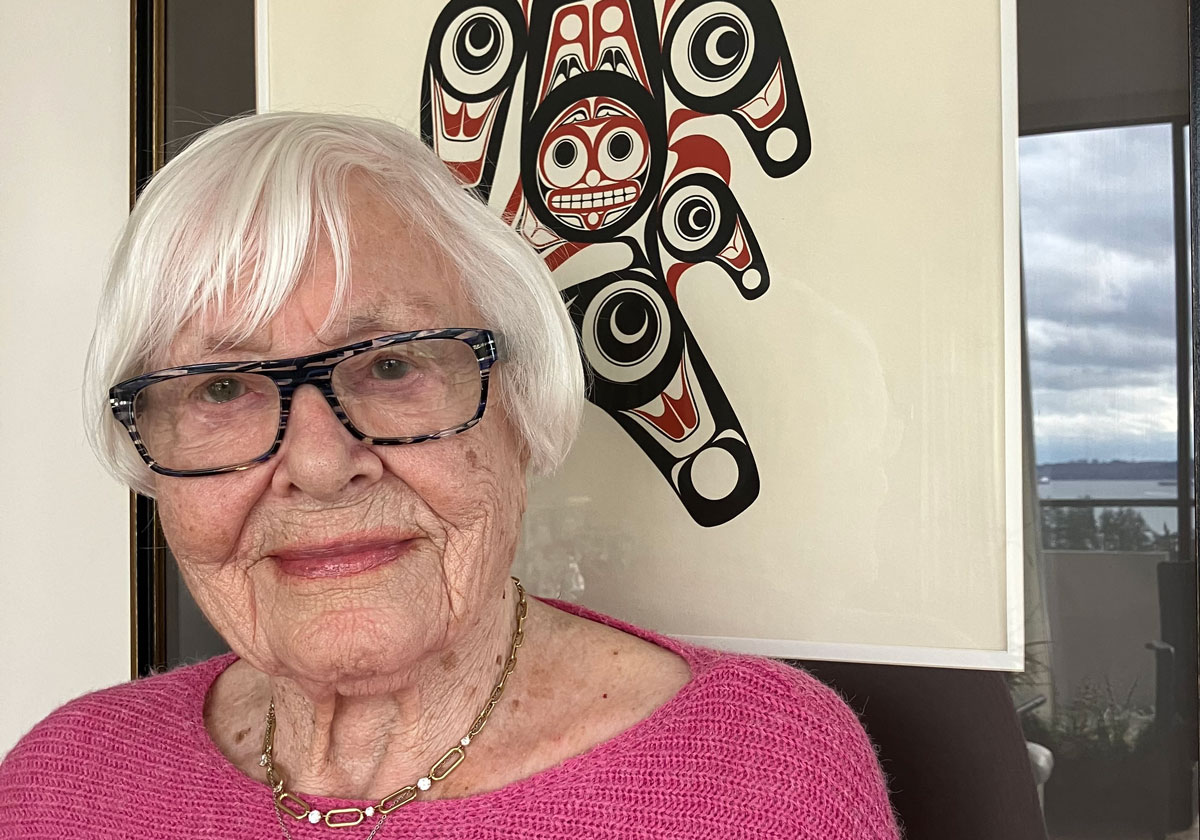A Century of Living: How Jessie Swail Was Shaped by Her Time at Vic

Photo courtesy of the Swail family
By Leslie Shepherd
Jessie Swail Vic 4T8 says she never imagined she would live to be 100 and certainly doesn’t feel one century old.
But when she reflects on the extraordinary journey that took her from humble beginnings in a small Alberta town, to wartime service in the Women’s Royal Canadian Naval Service, a long career in social work and a 67-year marriage, she credits Victoria College with being a major influence.
“I fell in love with it. I loved Victoria. I loved everything about it,” she says of the transformative years she spent earning her BA. “I learned so much about how to conduct my life that I never learned coming from a small town and a working-class family.”
Swail was born in Bannockburn, Scotland. She came to Canada when she was three with her mother and three siblings to join her father who had settled in the small town of Exshaw, Alta., near Canmore.
She graduated from high school in Banff in 1939 just before the start of the Second World War. As soon she turned 18, she joined the Women's Royal Canadian Naval Service, known as the Wrens, and was posted to the Point Edward Naval Base on Cape Breton Island throughout the war.
Returning to Banff in June 1946, she started waitressing at a local restaurant, where a middle-aged couple staying at the Banff Springs Hotel became regular customers. When they asked her why she was waiting tables, she said she was saving money to go to the University of Alberta in Edmonton.
The husband wasn’t impressed, and said “I’m going to arrange for you to go to Victoria College in Toronto, where I graduated.” And he did. That man was Lester B. Pearson Vic 1T9, who would become Canada’s 14th prime minister after winning the Nobel Peace Prize in 1957 and serving as Victoria University’s chancellor from 1952 to 1959.
Swail earned her general arts degree from Vic in only two years as she was given credit for one year for her service in the Wrens. Swail said her time here influenced the rest of her life.
She recalled the Dean of Women at the time, Dr. Jessie Macpherson, ran Annesley Hall “like a Swiss finishing school.” Students had to take turns acting as hostess at the head of the dining table, serving and conducting conversations. Only one conversation at a time was permitted and the topic had to be both interesting and relevant. The young women also had to bring guests to high tea on Sunday and introduce them properly.
After she graduated from Vic, Swail returned to Banff where she met Norman Swail, one of the many Alberta university students who drove buses for tourists, and married him the following year. They were married for 67 years until he died in 2015. They had four children, one of whom, David, is also a Vic grad 8T1.
Jessie and Norman decided to move to Vancouver, where they both enrolled in the University of British Columbia. He earned a degree in economics, and she got an MA in social work. She worked for the City of Vancouver and the provincial government before Norm’s job with Shell Oil took them across Canada, to Winnipeg, Hamilton and Toronto.
In Winnipeg, Swail worked as a journalist. She had a 15-minute radio commentary, which she would write the night before after her kids went to bed, and a TV program called All in the Family, where she “brought in families to talk about their problems,” long before the TV show produced by Norman Lear.
While working for the CBC in Winnipeg, Swail met another future prime minister, Pierre Elliot Trudeau, who was campaigning for the Liberal leadership—to replace Lester B. Pearson.
Swail went to the Fort Garry Hotel to ask Trudeau to answer a few questions.
“He was very co-operative,” she recalled. “I was interviewing him when his aide Tim Porteous came by and said, ‘Mr. Trudeau we have to go to the airport; the cab is waiting.’ Mr. Trudeau said, ‘Why don’t you come with us and finish your interview?’”
She did, but sadly when she got back to her studio, discovered all she had on her tape recorder were car sounds.
Swail also wrote for The Toronto Star, Star Weekly and Golf Digest. She also wrote a book about physics. While it was never published commercially, her children had it printed and bound. Swail said she never dreamed she would live to be 100, which happened on Oct. 19, 2024.
“I never paid attention to my age until suddenly I was turning 100 and everyone was making a fuss.”
Swail said she doesn’t feel 100. She still lives by herself in her 18th-floor West Vancouver apartment near Burrard Inlet, where she has six prints by Bill Reid, a Haida artist considered one of the most significant Northwest Coast artists of the 20th century (she and Norm were in the same class at UBC as his uncle Percy Gladstone), and two masks carved by Jimmy Joseph, purchased when he was a teenager, before he became a master carver.
What advice would she give today’s Vic students?
“The universe is unfolding as it should. Don’t get in the way. Say yes to life. When you say no, you stop the universe in its tracks. Be a positive person and always have positive thoughts.”
The Jessie (Millar) Swail and David Swail Scholarship was established in 2016 to express the Swails’ profound affection and respect for Vic and to help other students to have the same wonderful experience they both had. It is awarded to Victoria College students who have completed their second or third year of study, with preference to those focusing on English.
